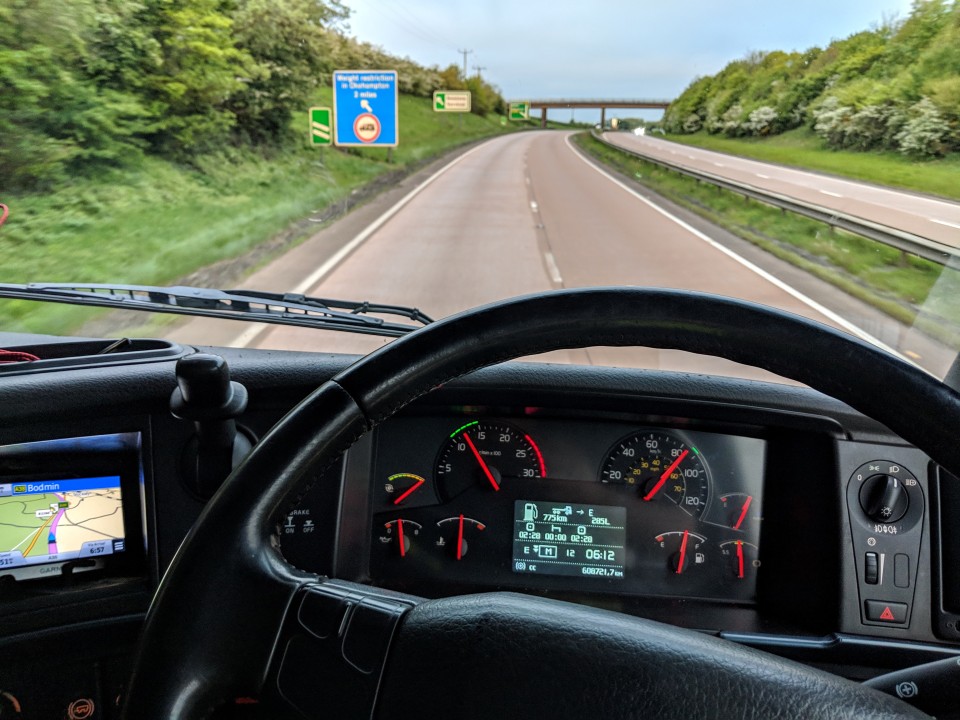
Susie Jones
Как да бъдем здрави шофьори на камиони
Създаден: 27.08.2024
•
Актуализирано: 27.08.2024
Шофирането на камион е трудна професия, която често включва дълги часове, заседнал начин на живот и продължително отсъствие от дома, което често се отразява на здравето на много шофьори.
Нездравословните навици, като например консумацията на бърза храна, липсата на физическа активност и нарушаването на режима на сън, могат да доведат до потенциални здравословни усложнения в бъдеще. Но как да поддържате добра физическа форма като шофьор на камион? По-лесно е да се каже, отколкото да се направи, но ние изготвихме списък със съвети, които да ви помогнат да поддържате върхова форма, докато сте на път.
Шест най-добри съвета за поддържане на здравето по време на път
1.Хидратация
Един прост съвет и стока, която често приемаме за даденост, но повечето здравословни проблеми се дължат на дехидратация. Редовните глътки вода или скуош през деня ще изхвърлят метаболитните отпадъци и токсините от организма ви и ще ви поддържат по-енергични и бодри. Държенето на бутилка с вода за многократно пълнене със себе си не само ще ви напомня да останете хидратирани, но е и по-добро за околната среда.
2.Диета
Изкушението на бързата храна след дълъг ден е нещо, с което всички можем да се съгласим, но както и поддържането на хидратация, диетата ви играе важна роля за вашето здраве, както и за това как ще се чувствате през деня.
Препоръчително е шофьорите на камиони да се хранят три до четири пъти дневно - две хранения и две закуски или две хранения и една закуска. Опитайте се да поддържате план за хранене и закуски с високо съдържание на омега-3, желязо и витамин С, като зеленолистни зеленчуци, риба и плодове. Избягвайте често консумирани храни и напитки като тестени изделия, хляб, сладки напитки и стимуланти като кафе и енергийни напитки.
Вижте нашия списък със здравословни закуски, които да държите в кабината си:
Барове с мюсли
Енергийни барове
Пуканки
Ядки
Сушени плодове
Черен шоколад
В допълнение към закупуването на здравословна храна по време на път, понякога може да е по-здравословно и по-икономично да се приготвя храна. Frieghtech разполага с фантастична селекция от рецепти, които да ви помогнат да поддържате здравословен хранителен режим, докато сте на работа.
3.Sleep
Поради естеството на работата, осигуряването на достатъчно сън може да бъде трудно за шофьорите на камиони и може да доведе до опустошителни резултати за всички на пътя.
Прости съвети и трикове като следните могат да ви помогнат да се наспите добре през нощта:
Създайте в кабината обстановка, която прилича на домашна. Вижте нашата публикация за това как да превърнете кабината на камиона в дом
Поддържайте зоната за сън на тъмно
Горещ душ: Използвайте нашата страница карти, за да разберете кои спирки за камиони предлагат това удобство.
Изпробвайте някои приложения, които да ви помогнат със съня
Намерете идеалното място за паркиране с малко шум и прекъсване. Нашето приложение intruck предоставя 5000 места за тежкотоварни автомобили в цяла Европа, от които можете да избирате, докато нашият екип SNAP Access and Security може да осигури индивидуални решения за сигурност, които да ви позволят да спите по-добре, знаейки, че вие и вашият камион сте в безопасност.
4.Упражнения
Един от най-трудните съвети, които трябва да се спазват по време на път, но въпреки това е важен. Дългите часове седене през деня могат да доведат до лоша стойка, болки в гърба и потенциални здравословни усложнения. След дълъг ден зад волана може да е изкушаващо да седнете и да се отпуснете, но една бърза 15-минутна активност като ходене или разтягане може да ви накара да се почувствате подмладени и по-малко стресирани.
HMD Trucking има някои полезни упражнения, пригодени за шофьори на камиони, ако искате да включите няколко вида физически упражнения в ежедневието си.
5.Vitamins
Пътуването на пълен работен ден може да затрудни набавянето на всички необходими витамини. Приемането на мултивитамини всеки ден може да подсили имунната ви система и да ви помогне да останете здрави.
6.Психично здраве
Знаем, че грижата за физическото здраве по време на път е важна, но колко време отделят шофьорите на камиони, за да се погрижат за психическото си здраве?

Благотворителната организация за психично здраве Mind публикува статистически данни, според които 30 % от самоопределящите се като свързани с работата заболявания в транспортната и логистичната индустрия се дължат на тревожност, самота, стрес и депресия. Те също така предполагат, че този брой може да е по-висок, тъй като повечето хора не търсят необходимата им помощ. Освен това 95 % от хората в отпуск по болест няма да посочат истинската причина за отсъствието си от работа, ако тя е свързана с психичното им здраве.
Следването на горните съвети и трикове може да има положителен ефект върху психичното ви здраве. Освен това е важно да водите открити и честни разговори с други шофьори на камиони, ръководители или диспечери.
Могат ли упражненията да ви направят по-добър шофьор?
Здравословният начин на живот не само води до по-добро психично здраве, но и показва, че може да ви направи по-добър шофьор. Проучване показва, че шофьорите, които са били помолени да правят упражнения всеки ден, съобщават за по-голяма лекота при завъртане на главата си, способни са да завъртят тялото си по-надалеч и са в състояние да се качат в автомобила си по-бързо.
Коя е най-трудната част от работата на шофьор на камион?
Дългите часове изглежда са един от най-трудните аспекти на шофирането на камион. Шофьорите на камиони често се сблъскват с дълги километри за изминаване и антисоциални часове. Тези дълги километри и антисоциални часове могат да доведат до нездравословен начин на живот.

Колко нездравословно е да си шофьор на камион?
Поради начина на живот на много шофьори на камиони, средно статистически е по-вероятно те да имат здравословни проблеми в сравнение с хората с други професии. Шофьорите на камиони често се сблъскват с няколко препятствия, като например тесни работни пространства, стресови ситуации, необичаен режим на сън и липса на питателна храна, които оказват влияние върху здравето им.
Поддържането на здравословен начин на живот като шофьор на камион изисква съзнателни усилия, но ползите от това си заслужават като цяло. Горните съвети ще ви позволят да поемете контрола върху здравето си и да подобрите благосъстоянието си. Следете за още съвети и трикове от нас в SNAP.



